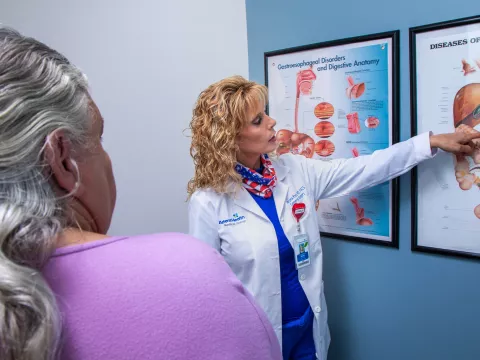- AdventHealth

Traveling expands your horizons and enriches your soul, but it’s no vacation for your immune system. Take extra care of your health before, during and after jet-setting to steer clear of illnesses. This kind of prevention is a priority for the Tampa Bay Lightning, too, as they’ll be traveling internationally in November.
How Traveling Raises Your Risk of Getting Sick
Being in tight quarters with so many other people, like in airplanes, buses and trains, makes you more susceptible than usual to airborne illnesses and conditions spread by germs.
Traveling to other countries — like the Tampa Bay Lightning when they go to Sweden in November — can also expose you to potential dangers that aren’t top of mind when planning your trip.
You may be more likely to get an infection in other countries for various reasons, including:
- Fewer vaccinated people, making infectious diseases more common
- Poor infrastructure, leading to contaminated food and water
- Warmer weather, which allows bacteria, parasites and mosquitos to thrive
The Most Common Travel-Related Illnesses
Some of the most common illnesses that people contract while traveling are:
- Colds
- Diarrheal diseases from contaminated water
- Fevers, like yellow or dengue fever, from insect bites
- Infections, such as food poisoning from contaminated foods
- Influenza (the flu)
While these conditions usually aren’t serious, they can worsen, and even become dangerous, especially if your body gets dehydrated.
Know the Symptoms of Travel-Related Sicknesses
You’re likely familiar with cold and flu symptoms, but you might not be sure what to look for with infection or parasitic illnesses. Symptoms from an infection generally appear within a few hours or days. However, in some cases, infection symptoms can appear much later than you’d think — after you’ve already returned home, for instance.
If you experience common travel-related conditions like food poisoning or a diarrheal disease, you may have symptoms like:
- Diarrhea
- Fever
- Nausea
- Vomiting
Fevers, viral illnesses or parasitic illnesses may cause symptoms like:
- Fever
- Headache
- Pain
- Rash
- Respiratory infection
If you’ve traveled to another country recently and experience these symptoms, don’t wait to make an appointment with your primary care physician.
How to Prevent Travel-Related Illnesses
Your efforts to stay healthy and well during your trip should start before you even board the plane. At least eight weeks before your departure, discuss your travel plans with your primary care physician or a physician who specializes in travel medicine.
Your doctor can help you:
- Get a prescription for medicines that can prevent illness
- Learn about food and water precautions that can keep you safe
- Receive any special vaccinations
- Update your vaccinations
While traveling, you can take precautions like:
- Avoiding swimming in freshwater
- Drinking only bottled water
- Preparing your own food or only eating at trusted restaurants
- Sleeping underneath a mosquito net
- Taking any preventive medicines your doctor prescribes
- Washing your hands often
- Wearing mosquito repellant
Treating Travel-Related Illnesses
If you feel sick during or after traveling, don’t ignore your symptoms. You may need to see a doctor who specializes in infectious diseases for diagnosis and treatment of travel-related infections. Your doctor will ask about your symptoms and where you’ve traveled recently.
Treatment for travel-related infections can vary widely depending on the condition and how severe it is. You may be able to receive care at home or may need to be admitted to a hospital.
Based on your symptoms, your doctor may:
- Take stool and blood samples to understand which infection you have
- Use medicines, including antibiotics or antifungal medicines, to treat your condition
- Recommend medicines like acetaminophen to help low fever and control pain
If you have a diarrheal disease or experience vomiting, it’s important that you drink water, electrolyte sports drinks or broths to help replenish your fluids and prevent dehydration.
Post-Travel Care in Tampa Bay
Once the Lightning are back after their international games, they regroup with their health care team to ensure they’re good to go for the next game. If you’ve been traveling, too, either abroad or otherwise, check in with your health care provider before hitting the stands in Tampa Bay.
If you’re feeling ill after traveling, speak to your primary care physician or visit an infectious disease physician if your doctor recommends one. If your primary care physician is not available, visit your closest AdventHealth Express Care at Walgreens location.
Learn more about how AdventHealth and the Tampa Bay Lightning partner together to improve the health and wellness of people in the Tampa Bay community.



